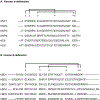Multifaceted immune functions of human defensins and underlying mechanisms
- PMID: 29501617
- PMCID: PMC6485945
- DOI: 10.1016/j.semcdb.2018.02.023
Multifaceted immune functions of human defensins and underlying mechanisms
Abstract
Defensins have been long recognized as natural antimicrobial peptides, but they also possess diverse and versatile immune functions. Defensins can both induce inflammation and suppress inflammatory responses by acting on specific cells through distinct mechanisms. Defensins can also modulate the immune response by forming a complex with cellular molecules including proteins, nucleic acids, and carbohydrates. The mechanisms of defensin-mediated immune modulation appear to be cell-type and context specific. Because the levels of human defensins are often altered in response to infection or disease states, suggesting their clinical relevance, this review summarizes the complex immune functions of human defensins and their underlying mechanisms of action, which have implications for the development of new therapeutics.
Keywords: Defensins; Immune functions; Pathways.
Copyright © 2018 The Authors. Published by Elsevier Ltd.. All rights reserved.
Conflict of interest statement
Conflict of interests
The authors have declared that no conflict of interest exists.
Figures
References
-
- Ganz T, Defensins: antimicrobial peptides of innate immunity, Nat. Rev. Immunol 3 (9) (2003) 710–720. - PubMed
-
- Klotman ME, Chang TL, Defensins in innate antiviral immunity, Nat. Rev. Immunol 6 (6) (2006) 447–456. - PubMed
-
- Lehrer RI, Lu W, Alpha-defensins in human innate immunity, Immunol. Rev 245 (1) (2012) 84–112. - PubMed
Publication types
MeSH terms
Substances
Grants and funding
LinkOut - more resources
Full Text Sources
Other Literature Sources


